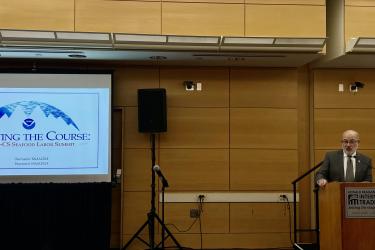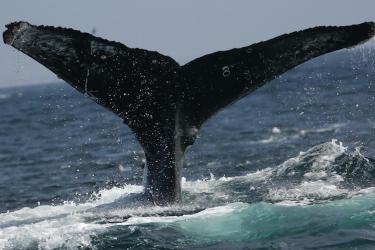Today, NOAA released its 2023 Report to Congress on Improving International Fisheries Management. The report identifies seven nations and entities engaged in illegal, unreported and unregulated (IUU) fishing, including two with issues related to forced labor, and two nations that target or incidentally catch sharks without regulations comparable to those of the United States. The United States will work with the identified parties to address IUU fishing and forced labor activities and support effective management of protected species and shark catch.
IUU fishing is a serious global problem that threatens ocean ecosystems and sustainable fisheries that are critical to global food and economic security — putting law-abiding fishermen and seafood producers in the United States and abroad at a disadvantage. There are also growing concerns regarding the exploitation of many shark stocks in international fisheries.
Effective management of shark catch — both targeted and incidental — is critical for shark conservation. Nations and entities that do not have regulatory programs to effectively manage shark catch or to reduce or mitigate bycatch threaten the sustainability of shared ecosystems and living marine resources.
“IUU fishing and other unsustainable fishing practices undermine U.S. and global efforts to sustainably manage fisheries and conserve marine resources,” said Janet Coit, assistant administrator for NOAA Fisheries. “Combating these practices is a top priority of the United States, and we’ll work with each identified nation and entity to remedy these activities and strengthen their fisheries management and enforcement practices.”
This is the first time, as part of this report, that NOAA Fisheries identified nations for shark catch. It’s also the first time the agency considered forced labor in the seafood sector when making IUU fishing identifications. Key elements of the report include the following:
- Angola, Grenada, Mexico, the People’s Republic of China, Taiwan, The Gambia and Vanuatu were identified for alleged IUU fishing in 2020, 2021 and 2022.
- The IUU fishing identifications for the People’s Republic of China and Taiwan include information related to the production of seafood-related goods through forced labor.
- The People’s Republic of China and Vanuatu were identified for shark catch without a comparable regulatory program to that of the United States.
The Report also includes certification determinations for the 31 nations and entities identified in the 2021 Report, certifying if they took actions to remedy their IUU fishing activities and/or bycatch of protected living marine resources.
- Costa Rica, Guyana, Senegal and Taiwan received positive certification determinations for taking actions to remedy the IUU fishing activities for which they were identified in 2021.
- Mexico, the People’s Republic of China and the Russian Federation received negative certifications for failing to take actions to remedy their reported IUU fishing activities.
- Of the 29 nations and entities identified in 2021 for protected living marine resource bycatch, 14 received positive certifications for taking corrective actions: Croatia, Egypt, the European Union, Grenada, Guyana, Japan, Mauritania, Morocco, the People’s Republic of China, Portugal, the Republic of Korea, Saint Vincent and the Grenadines, South Africa and Taiwan.
- Fourteen nations received negative certifications for not having a regulatory program comparable to that of the United States to reduce bycatch of sea turtles in pelagic longline fisheries: Algeria, Barbados, Côte d’Ivoire, Cyprus, France, Greece, Italy, Malta, Namibia, Senegal, Spain, Trinidad and Tobago, Tunisia and Turkey. Additionally, Mexico received a negative certification for its lack of a comparable regulatory program to reduce or minimize bycatch of endangered North Pacific loggerhead sea turtles.
Negatively certifying a nation or entity may result in certain measures, such as denial of that nation’s or entity’s fishing vessels’ U.S. port privileges and entry into navigable waters of the United States, and potential prohibition of imports of certain fish or fish products from that nation or entity into the United States.
“NOAA Fisheries is committed to working with nations and entities to address these activities by encouraging implementation of effective fisheries management and enforcement practices globally,” said Alexa Cole, director of NOAA Fisheries Office of International Affairs, Trade, and Commerce. “These collaborative efforts help to ensure that the fish and fish products we import are sustainably and legally caught.”
The report illustrates how NOAA works to improve international fisheries management by:
- Developing law enforcement capacity and best practices to combat IUU fishing.
- Supporting the effective management of protected species and shark catch.
- Ensuring a fair market for the U.S. fishing industry.
Read the 2023 Report to Congress on Improving International Fisheries Management.
Media contact
Lauren Gaches, nmfs.pa@noaa.gov, (202) 740-8314

